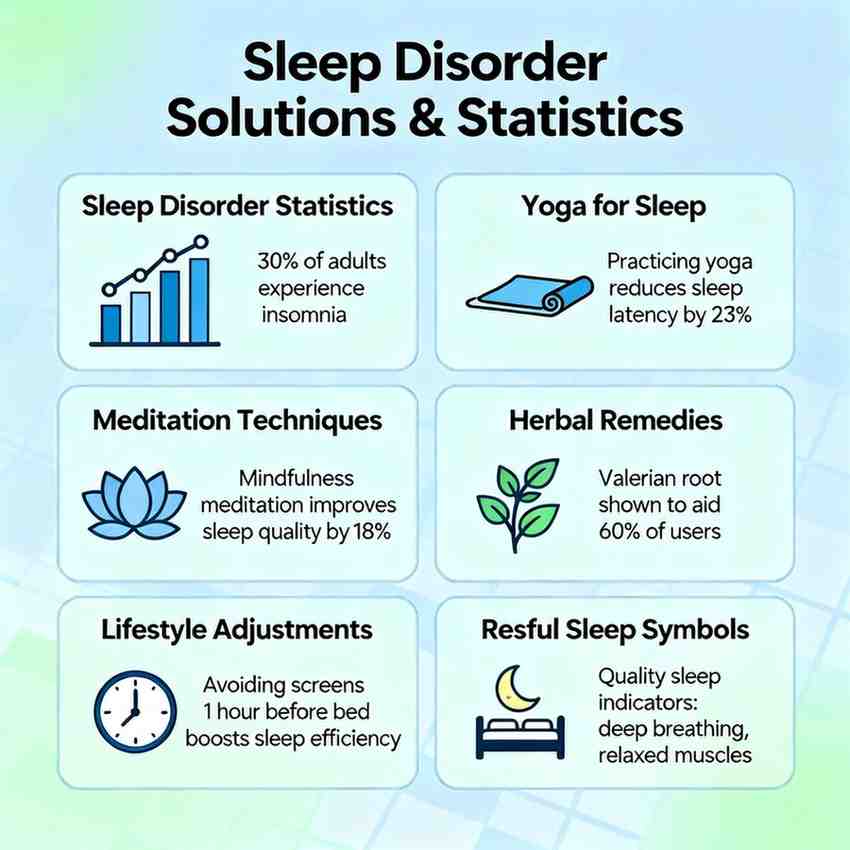Sleep disturbances are a growing global health concern that impacts millions of individuals annually. Recent polls show that almost 70 million adults in the US suffer from a sleep issue, and around 25% of respondents say they have been diagnosed with one. According to studies, between 10% and 30% of American adults suffer from obstructive sleep apnea, and between 30% and 40% of them suffer from insomnia symptoms annually. Around the world, the issue is just as serious, with 67% of individuals reporting sleep problems at least once a night and over 30% of adults suffering symptoms of insomnia. Despite its prevalence, many people are still ignorant of practical remedies, which is why this article concentrates on what is the sleep disorder treatments in ayurveda ,including natural and safe ways to enhance sleep quality, such as yoga, meditation, herbal therapies, and lifestyle modifications.

The effects of inadequate sleep on one’s general well-being, physical performance, and mental health can be serious. Even though eight out of ten persons globally say they would like to get better sleep, 60% have never received medical assistance. This emphasizes how important it is to look into safe, all-natural, and efficient sleep-improving techniques that go beyond traditional therapies.
What are Sleep Disorders ?
Regularly experiencing poor sleep quality could indicate a sleep disorder. A sleep disorder is a condition that impairs a person’s quality of life and results in persistent sleep deprivation. The medical director of the Indiana Sleep Center, Abhinav Singh, MD, states that “poor quality or quantity of sleep is a defining characteristic of a group of conditions known as sleep disorders.”
Issues with the quantity, timing, and quality of sleep lead to sleep disorders (also known as sleep-wake disorders), which cause distress during the day and impede functioning. Disorders of sleep and wakefulness frequently coexist with illnesses or other mental health issues like anxiety, depression, or cognitive impairments. Although there are many varieties of sleep-wake disorders, insomnia is the most prevalent. Other sleep-wake disorders include restless legs syndrome, narcolepsy, parasomnias, and obstructive sleep apnea.
How Sleep Disorders are Formed
In Ayurveda, sleep is called “Nidra”, and it’s considered one of the pillars of good health.According to Ayurveda, the three Doshas—Pitta, Kapha, and Vata—have a major influence on how well you sleep. Sleep issues or disorders may result from an imbalance in these doshas.
1. Vata Dosha Imbalance (Air/Movement Energy)
What it does: Vata regulates the body’s energy, flow, and movement.
When Vata levels are too high, your mind becomes restless, nervous, or hyperactive.
- Impact on sleep:
- Having trouble to to fall asleep (insomnia)
- waking up several times during the night
- Having trouble sleeping or having restless nightmares
- Common reasons:
- Unusual daily schedule
- Having too much sleep at nigh
- Anxiety or overthinking
- Excessive caffeine intake
2 . Pitta Dosha Imbalance (Fire/Digestion Energy)
What it does The Pitta regulates the body’s heat, metabolism, and digestion.
When it is increased, irritability, overthinking, and interior heat are the results.
Impact on sleep:
- Having trouble sleeping
- Being awake in the middle of the night
- Having a hot or restless night’s sleep
- Typical causes:
- Nighttime heavy or spicy meals
- Mental Stress or anger
- Exhaustion and overwork
3. Imbalance of Kapha Dosha (Earth/Water Energy)
- What it does: Kapha provides the body with structure, stability, and serenity.
- When Kapha is high, it causes you to feel heavy and lethargic.
Impact on sleep:
- Oversleeping
- Feeling sleepy throughout the day
- Still tired after waking up
Typical reasons:
- Food that is heavy and greasy
- Oversleeping or irregular sleep patterns
- A lazy way of living
4. Modern Lifestyle
- Everyday behaviors might impact sleep:
- Overuse of screens and cell phones right before bed
- Fast food, sporadic meals, and daily schedules
- Working late or having erratic sleep habits
What is the Sleep Disorder Treament in ayurveda that Really helps for Better Sleep ?
Ayurveda focuses on balancing the three Doshas (Pitta, Kapha, and Vata) while enhancing digestion (Agni), eliminating toxins (Ama), and promoting mental calmness in order to cure sleep disorders such insomnia, restless sleep, or poor sleep quality. Ayurvedic treatment is complete and seeks to enhance sleep over the long term without the use of temporary solutions.
1. Vata Balance
The goal of Ayurvedic treatment for Vata Balance is to relax the nervous system, which frequently results in restlessness and anxiety. In addition to everyday practices like warm oil massages (Abhyanga) before bed, herbs like ashwagandha, jatamansi, and brahmi are frequently employed. Adjusting one’s lifestyle to balance Vata and encourage sound sleep includes minimizing screen time, cutting back on caffeine, avoiding overthinking, getting to bed early, and engaging in mild meditation.
2. Pitta Balance
Cooling the body and mind requires maintaining Pitta balance. A peaceful, cool sleeping atmosphere, light evening meals, and herbs like Brahmi, Shatavari, and Guduchi all aid in achieving this balance. Meditation, pranayama, and deep breathing are all excellent ways to preserve Pitta equilibrium and decrease sleep problems brought on by heat or excessive activity.
3. Kapha Balance
A balanced kapha ensures energy without becoming too sleepy. Regular physical activity, such as yoga, walking, or light exercise, together with stimulating herbs like ginger, pippali, and tulsi, assist balance Kapha. Refreshing, revitalizing sleep is also facilitated by avoiding big, fatty evening meals and maintaining an active daily routine.
4. Ayurveda Recommends
Additionally, Ayurveda suggests treatments to promote Dosha balance. Shirodhara (warm oil dripping on the forehead) eases stress and supports Vata-Pitta balance, Abhyanga (warm oil massage) eases Vata and nervous tension, and Nasya (nasal administration of herbal oils) encourages mental peace. Ama (toxins) that interfere with sleep and general health can be eliminated by physical detoxification.
Daily habits and lifestyle choices are essential for preserving Dosha balance and improving sleep quality. Balanced sleep is supported by regular bedtimes and wake-up times, avoiding screens right before bed, eating light, easily digested evening meals, and engaging in physical activity, meditation, pranayama, or moderate yoga. Establishing balance also involves cutting back on alcohol, caffeine, and substantial late-night eats.
5. Natural ways to improve Sleep
Warm milk with honey before bed is an easy and efficient Ayurvedic way to improve sleep quality. Honey adds a mild sweetness that encourages relaxation, and warm milk, which is inherently soothing, supports Vata balance by nourishing the nervous system. The body and mind can relax with this combination, which can facilitate getting rest and enhance the quality of sleep in general. It is advised to consume it 30 to 60 minutes prior to bedtime for optimal benefits.

Soaking 10 to 15 raisins in water overnight and eating them on an empty stomach in the morning or before bed is another easy Ayurvedic method for enhancing sleep. Rich in natural sugars, antioxidants, and minerals, soaked raisins also help to balance the Vata and Pitta Doshas by nourishing the body and calming the nervous system. This gentle, natural remedy can help you relax, reduce restlessness, and support better sleep quality.
One well-liked Ayurvedic treatment for encouraging sound sleep is shankhpushpi tea. Before going to bed, brew a warm, soft tea by boiling the Shankhpushpi plant in water. This tea facilitates natural sleep by calming the mind, lowering stress, and calming the nerve system. Frequent ingestion promotes the balance of Vata and Pitta and can enhance the general quality of sleep without causing any negative side effects.
Can Ayurveda Help Reduce Insomnia and Improve Sleep?
By relaxing the mind and reestablishing bodily equilibrium, Ayurveda can help reduce insomnia and enhance sleep. Ayurvedic principles state that imbalances in the three doshas—Pitta, Kapha, and Vata—are frequently the cause of sleep problems. By resolving these imbalances naturally, sound sleep can be restored. This may involve sleeping on a regular basis, eating light meals, doing gentle yoga or meditation in the evening, and taking herbs like Brahmi, Shankhpushpi, or ashwagandha to calm the nervous system. Herbal teas, soaked raisins, or warm milk with honey can also help induce deeper sleep and relaxation. When combined, these techniques not only naturally lessen insomnia but also enhance sleep quality in overall.
How much Sleep is two much ?
Your age and lifestyle actually determine how much sleep is “too much.” While most adults can get by on 7 to 9 hours, children and teenagers naturally require more.
- Newborns (0–3 months): 14–17 hours (nighttime and naps included)
- 12–15 hours for infants (4–11 months), including naps and at night.
- 11–14 hours for toddlers (ages 1-2) (including naps and at night)
- Preschoolers (ages 3-5): 10–13 hours (night and nap included)
- Children at school (6–13): 9–11 hours
- 14–17-year-olds: 8–10 hours
- Adults: 7-9 hours (18–64)
Interesting Facts about sleep
There is a sleep state called the semi-lucid sleep state. It happens when you’re dreaming but also slightly aware that it’s a dream. You’re not fully in control, but you know what’s happening. It feels like being half awake and half asleep — your body is resting while your mind stays active.
In this state, you might see vivid images, hear sounds, or feel sensations that seem real. Sometimes, you can even guide parts of the dream. This usually occurs during REM sleep and can help you relax deeply, boost creativity, and support emotional healing. Some people practice meditation or yoga nidra to enter this peaceful state intentionally.
Does less sleep cause hair loss ?
Yes, sleep deprivation may be a factor in hair loss. Stress, hormone imbalance, and poor blood circulation are all consequences of sleep deprivation that can weaken hair follicles and delay hair growth. Long-term sleep deprivation may raise the stress hormone cortisol, which can cause hair to shift into the resting phase and eventually shed. Lack of sleep, when coupled with unhealthy eating habits or other medical conditions, can cause hair to become thinner and more sensitive to coming out.
Conclusion :
Modern science and Ayurveda both emphasize how important sleep is for general wellness. Ayurveda states that when the three Doshas—Pitta, Kapha, and Vata—are out of balance, sleep difficulties frequently result. Sleep can be naturally enhanced by restoring equilibrium through nutrition, lifestyle choices, therapies, and medicines. Physical exercise, meditation, and a regular sleep schedule, in addition to simple cures like warm milk with honey, soaking raisins, Shankhpushpi tea, and herbal flower decoctions, promote relaxation and improved sleep quality.Insomnia, stress, and hair loss can result from sleep deprivation, but these problems can be avoided with a comprehensive strategy that focusing on daily routines, diet, and Dosha balance. Keeping to these routines improves general physical and mental health and encourages deep, peaceful sleep.



[…] Yes,Sleep is very important for healthy weight gain because it allows your body to repair, grow, and use nutrients efficiently.Here’s how […]